You may have seen the head-scratching moment when an amateur player folded aces preflop.
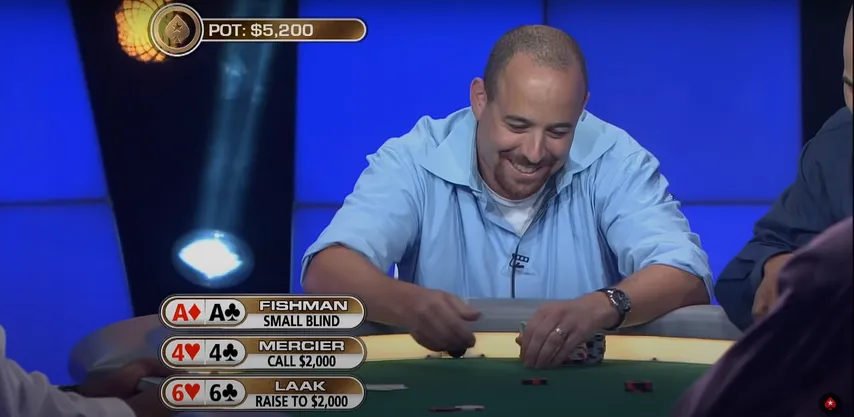
Aces, pocket rockets, the angels, and the best starting hand in Holdem – tossed into the muck as if it was . To make the whole situation stranger, the player was a math teacher.
The reason for this poker sin?
As other players pointed out after the show, Fishman was up a huge amount of money – triple his yearly salary according to the commentators. For him, it was right to fold everything and take home the prize (he also threw away pocket Kings preflop).
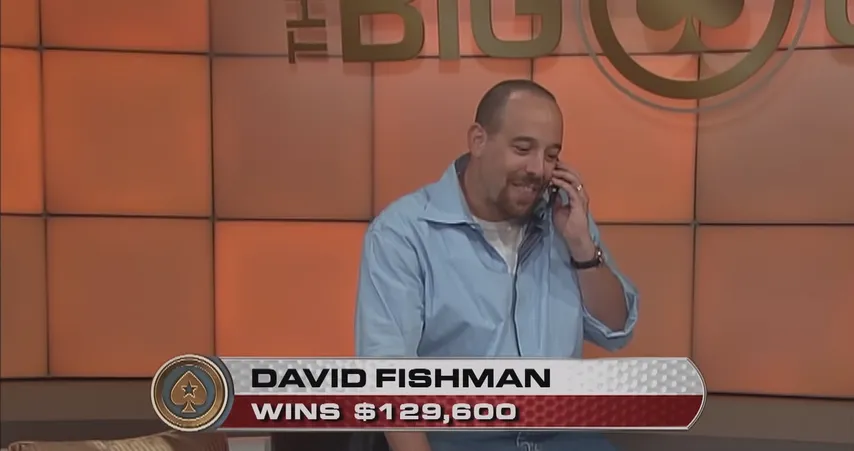
In a video nobody thought they'd ever see, Jonathan Little gave us a full rundown on folding Aces preflop.
When to Fold Aces Preflop
Today, we're going to discuss when you should put poker to shame and fold pocket aces before the flop. In all poker situations, every single decision you make will win or lose some amount of expected value, which you will realize in the long run. Every play you make wins or loses some amount of money on average, right? So, when there are payout implications in a tournament, folding actually makes you money because other players can go broke, giving you a payout increase.
Now, normally when you're playing a cash game, there are no payout implications unless there's some bizarre promotion or something happening. But assuming it's a regular cash game, there are no payout implications. You should never fold pocket aces before the flop. However, there will be some times in tournaments where folding makes money, and sometimes in a tournament, folding can make a lot of money. This very often results in incredibly cautious play from the short and middle stacks, super deep in tournaments, and sometimes on the bubble.
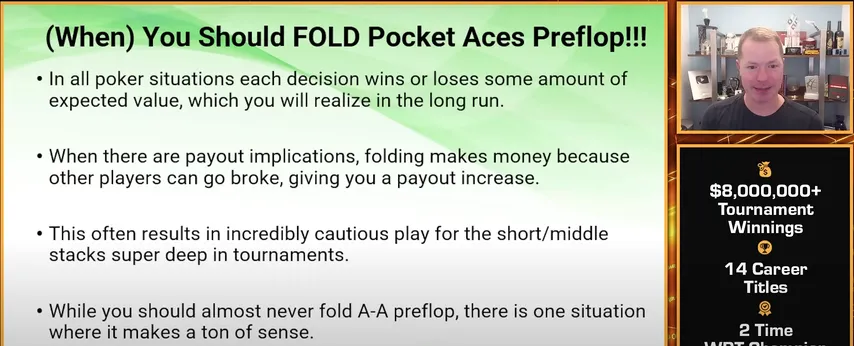
While you should basically never fold pocket aces before the flop because just straight-up playing that hand for its value is very profitable, there is one situation where it makes a ton of sense.
Folding Aces Preflop in Satellite Tournaments
Say you're playing a satellite tournament where 10% of the field, the players who entered, get 10 times their buy-in and everybody else gets nothing. So, let's say there's 100 people who played, the top 10 will get 10 times their money, and everybody else gets nothing. This basically makes a very odd payout structure where the top 10 get 10x and there is no real benefit of winning the tournament. Your goal is to just sneak in the money. That's fine because everyone who gets in the top 10 gets paid the same amount.
Let's presume a situation where 300 players started and 30 get in the money, and 31 people remain. The next person out gets nothing, everyone else gets 10 buy-ins. Let's say you have an average stack of 20 big blinds. Okay, there's a player in the tournament with two big blinds and three other players with fewer than five big blinds. This is a really good spot for you because you don't really have to gamble, right?
Let's say everyone folds to the small blind, who is the big stack with 50 big blinds, and he goes all in and turns up his favorite hand, Jack four offsuit. All right, you have pocket aces. Should you call?
Well, Aces are in pretty good shape against Jack four off suit, right? It has 87.6% equity. So, 87.6% of the time, you get a double up. Now, you're not in the money yet, but you do get a double up, and with 40 big blinds, you're basically locked to get in the money. However, you should fold this situation every single time because you will get in the money way more than 88% of the time simply by folding for the next few orbits because someone else in the tournament will almost always go broke.
Let me get a calculator. Let's just think about this, right? Say there's 30 people, you're one out of 30. You are going to bubble this 3.3% of the time if all things are equal in the tournament. However, again, I just told you a second ago, there's a two big blind stack and three other players with fewer than five big blinds. So, one of those is way more likely to go broke than everyone else, right?
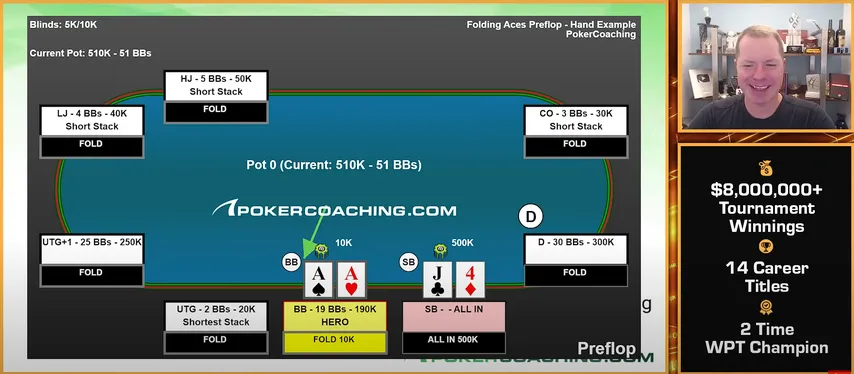
And often in a tournament, if you have an average stack, you're actually in decent shape because most people have below average because it is possible for people to have more than 2x average, right?
So, would you rather get in the money, or would you rather not cash 13.3% of the time, or would you rather not cash 3% of the time? Obviously, you'd rather just take the 97% shot and get in the money.
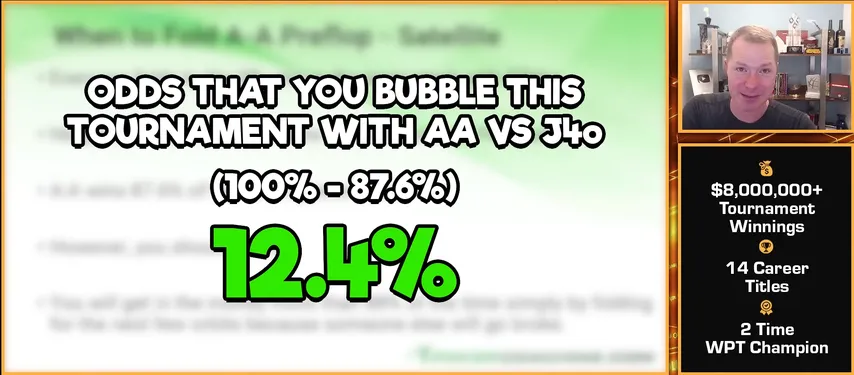
Folding Aces Preflop in Regular Tournaments
Let's take a look at another spot. Playing in a tournament that's a little bit more dicey. I think a lot of people realize the satellite scenario, but sometimes in a regular No Limit Hold'em tournament, you should actually fold pocket aces. This is a normal tournament with a normal payout structure. Let's say 300 people remain and 31 get in the money for two buy-ins. Maybe in your venue, it's 1.5 buy-ins, maybe it's 1.7 buy-ins. It seems to be all over the place nowadays in poker tournaments, between 1.5 and two. Either way, the situation is going to apply.
Let's say you have 0.1 big blinds on the button, almost nothing. Maybe you just got it in with Aces and you lost to the Jack four, and you're down to 0.1 big blinds. Everyone folds around to you. What should you do? Well, you should fold. Why should you fold in this scenario? Well, you're basically never going to spin up 0.1 big blinds to a meaningful stack that gives you a chance to win the tournament, which is something that's annoying and you have to accept.
I realize when you play a tournament, you're trying to win, but when you have 0.1 big blinds and the average stack is whatever, 15, 20, 30, it's hard to turn 0.1 into 15, 20, 30, 40, 50, 100, right? It could happen, but it's probably not. Again, though, because there are in this situation 300 players remaining and 301 get in the money, I'm sorry, 301 get in the money and there's 300 remaining, or any other very large field, this is something like a WSOP event where 2,000 people started, right? Someone's going to go broke because they're going to get their Aces and they're going to not find a way to fold, and they're going to lose, and you're going to sneak in the money.
In this situation, your tiny stack is worth something like 1.5 buy-ins or so, maybe even a little bit more if you just sit here and sneak into the money. Now, I realize that in your tournament, very often everybody will be watching you. They think, "Oh, this player's going broke next, obviously." But very often, you won't because the medium and big stacks actually are still trying to win the tournaments, and they, if they get Aces and lose anything before the flop, like they're fine with it because they were trying to get 40 starting stacks or something, right?
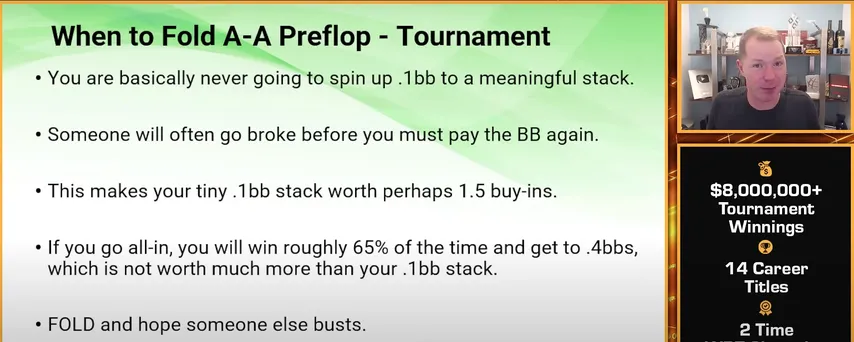
But with your 0.1 big blind stack, your goal is to just hang around. Understand that if you do go all in with your pocket aces here for your 0.1 big blinds, you will win roughly 65% of the time against the small blind and the big blind. And if you do that, you get to 0.4 big blinds, which is not a whole lot more than your 0.1 big blind stack. And if you go in next hand or whenever you get another good hand for 0.4 big blinds, you still have to beat two people again, probably with less than 65% equity because most hands aren't as good as Aces, or no hands are as good as Aces. And then you have to win another hand. So, this is a spot where you just want to fold and hope someone busts.
I know it's annoying to realize I'm just going to collect the cash and go home, but very often that is what you should do. I want to make it crystal clear though, if you have a medium stack on the bubble and you get Aces and someone wants to put you all in, you're not trying to fold because if you can double up to 10 buy-ins, you're in good shape and you can actually try to win the poker tournament. But with a tiny, tiny, tiny stack, you're not winning and if you can sneak into the money, you should be thrilled. And very often, you can in large field events.
Now, notice here in this situation I said 300 players remain. If you're down to like let's say 14 players and 13 get in the money and you have 0.1 big blinds and you look around the tournament and nobody else really has a short stack, that's a rougher one, but you probably have to play because everybody's sitting there looking at you. They're not going to put their money in without a really good hand. Even the short stacks are going to just sit there and wait until you get in the big blind. They're going to take the blinds. They're not going to like it. They're going to lose some money. And then they're going to hope you lose two all-ins in a row, which you know, you probably will.
So, understand that this situation is unique because there are a lot of players in the tournament. If there are a lot of players in the tournament, someone's going to run a good hand into another good hand and they're going to go broke. Besides these scenarios, you should pretty much never fold pocket aces pre-flop. A situation that sometimes you all ask me about in the comments below is if five people go all in before you, should you fold with Aces? Well, assuming they're going all in with the top 10% of hands, you shouldn't fold Aces because even though you're only going to win 48% of the time against five top 10% hands, realize you're putting in 16.7% of the money and you're getting back 48% of it. That's a very good deal.
In this scenario, stacks are 20 big blinds. You put in 20 to get back 0.48 times 120, those six player stacks, right? Yours plus your opponents, which is 57.6 big blinds. You own 57.6 of 120, which gives you a gigantic 37.6 big blind profit because you have to take out the amount you put in, right? You should not fold away a gigantic profit. Sometimes you're going to lose. You must accept variance. And even here, this isn't even real variance. Better questions are like, what do you do if you have Kings or Queens or something like that? But look, you can't go around folding pocket aces before the flop without a very good reason. And most reasons are not anywhere near good enough.

Essentially, you want to make more money by folding Aces than you do by putting your money in with Aces. And because Aces have such a huge amount of equity, very, very rarely will that be the case unless there are extreme payout implications. Someone else should you fold Aces? You should not. Besides that, do not fold pocket aces. Do not fold pocket aces. All the exclamation points.
Do not fold pocket aces unless there are extreme payout implications.
